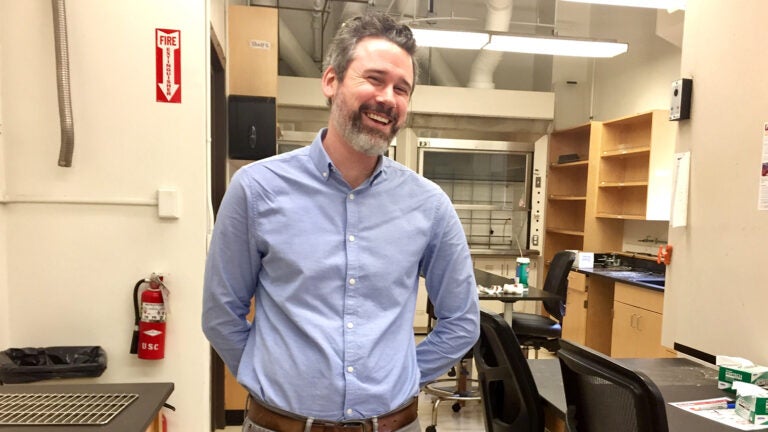
Cancer experience inspires chemist both as a researcher and a science communicator
Ten years ago, Michael Inkpen had a busy schedule, shuttling from the chemistry lab where he pursued his Ph.D. studies by day to the London clubs and bars where he performed with an indie rock band well into the night. That changed abruptly when one day he felt a lump in his neck.
In retrospect, Inkpen sees something worthwhile in the life-interrupting diagnosis of Hodgkin lymphoma that followed. His cancer turned out to be highly treatable, and experiencing serious illness firsthand elicited a philosophical outlook that has stuck with him in the years since.
“Life is too short to get hung up on small things,” said Inkpen, assistant professor of chemistry at the USC Dornsife College of Letters, Arts and Sciences. “It was a humbling journey, realizing that you’re essentially just a bag of water, and amazing, really, that you’re here at all.”
After chemotherapy and radiation treatment, Inkpen’s cancer was in remission. He returned to juggling chemistry and club gigs before ultimately pulling back from performing to focus entirely on earning his Ph.D. Then, after a postdoctoral stint at Imperial College in the U.K., he spent two years at Columbia University in New York and one year at the University of Rennes 1 in France on an EU-funded Marie SkÅ‚odowska-Curie Postdoctoral Global Individual Fellowship. This past January, his path led to Los Angeles, where he joined USC Dornsife and set about designing his own lab.
“Moving to Los Angeles and joining USC offered a dream opportunity to design and build my own independent lab and create a research group at a top university in a world-class city,” Inkpen said.
Building blocks
Inkpen’s research is located at the interface of chemistry and physics; his goal is to better understand how molecular systems can be used to transport electric charges. Building on his interdisciplinary training, he aims to both synthesize new materials and then study their properties by connecting them between tiny, nanoscale electrodes.
His approach is reminiscent of LEGO bricks — he explores relationships between individual molecular building blocks and their extended, assembled chemical structures in one, two and three dimensions. This research might eventually bring about insights into and breakthroughs in energy storage or molecular-scale electronics.
Moore’s Law famously predicted in the 1960s that improvements in microchip transistor manufacturing would yield ever smaller components, resulting in steadily increasing computing capability. This principle has so far held true, as seen in today’s compact, more powerful devices. (Think smartphones.)
“If you extrapolate Moore’s Law, you eventually get to molecular-sized circuit components,” Inkpen said. “In addition to their small size, molecular components are highly customizable and demonstrate unique properties tied to quantum mechanics. Today there is growing interest in exploring what molecules can do that traditional silicon-based technologies cannot.”
Inkpen is particularly interested in how the introduction of positive or negative charges may change the electronic properties of materials. This is akin to how charging a balloon by rubbing it against hair will let it stick to a wall, whereas, demonstrating a different behavior, an uncharged balloon simply falls to the ground.
Scientific storytelling
Beyond the science itself, Inkpen is fascinated by how science can be shared with diverse audiences in innovative, creative ways. Human connection is important in science, he said, and the desire for it is what led him to cofound a band so many years ago.
“The Ph.D. can sometimes be a lonely business, particularly when your experiments aren’t working out and you don’t know why,” Inkpen said. “Writing songs and gigging was fun, and provided a healthy counterpoint to long hours at the chemistry bench.”
Today, Inkpen attends science cafes and follows science bloggers and vloggers, including Derek Lowe of In The Pipeline, Dianna Cowern of Physics Girl, and the University of Nottingham’s Periodic Videos. Inkpen is a fan of the late physicist Richard Feynman, legendary for popularizing science in unique ways as well as for bongo drumming. Feynman, a Nobel laureate, published accessible works on the philosophy of science and delivered TV interviews and lectures in a timeless, inimitable style.
“These scientific rock stars didn’t stay in their ivory towers doing experiments, they embraced unconventional approaches to show millions of people why what they do, and how they think, is fascinating and relevant,” Inkpen said.
It’s no surprise that besides teaching and mentoring graduate students, Inkpen enjoys occasionally blogging about chemistry and life as a researcher and plans to boost his involvement in science outreach to K-12 and underserved college populations.
“For me, being a scientist is not only about the results and hard data; you are part of a community,” he said. “I have frequently been inspired over the years by captivating school experiments, science documentaries, blog posts or even simple tweets, and I am determined to pay it forward.”